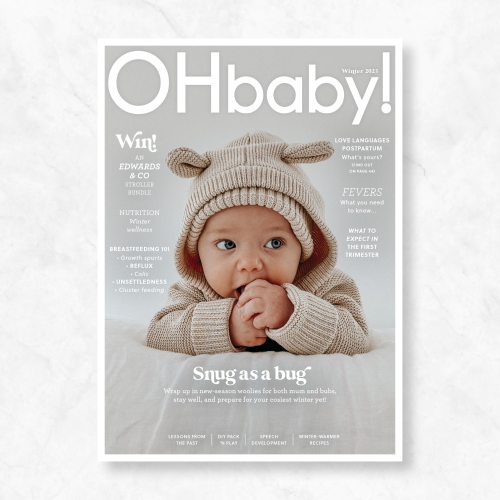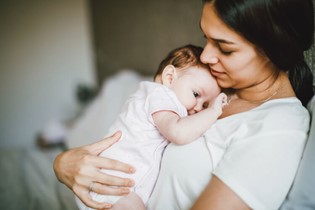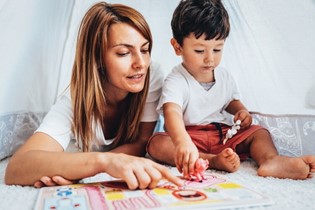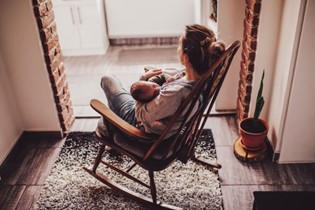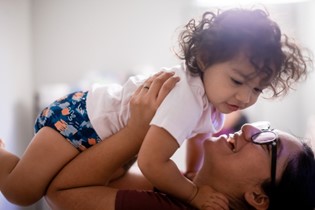How parenting advice has changed since the 1960s

David Hill, author and father, describes what it was like parenting in the 1960s and offers advice for parents of today.
When our son Pete was born, in the late 1960s, various experts knew exactly how we should treat him. Inside every baby lurks a potential little tyrant, they told us. Baby must have rules and order. We'd read Dr Spock, who supported a much less rigid regime, but these were local voices, speaking directly to us, and we felt we had to follow their rules.
So Beth and I fed Pete at four-hour intervals, as those experts decreed. If he woke early, we'd walk him, rock him, do everything except feed him, while Beth's breasts ached, and time crawled towards the magic four hour mark.
Or, if he was still asleep, we'd stand uncertainly by his cot, staring at the tiny arms flung wide, breathing in the powdery, warm-body smell of new baby. Then we'd wake him, and insist he feed.
The 1960s experts had instructions about nights as well. Baby must learn to sleep till morning. Baby must not expect attention each time he wakes. So when Pete called at 3am, Beth and I hunched in bed, while his creaky little cries grew into distressed wails.
When he'd finally sobbed himself into silence, we'd creep through and find him, soaked with sweat, eyes swollen, jerking uneasily as he slept.
We felt guilty, inadequate. Community nurses urged us to be firm; hinted that other parents were just sailing through the early months. Beth became sure she was a failure as a mother. I knew I was a hopeless father. To make things worse, it was the time when fathers were first allowed to be there at the birth. New dads described holding the baby as it emerged; helping cut the cord. But Pete's birth had been a protracted and painful one. I was sent away, to pace the waiting room.
Beth needed a general anaesthetic, after hours of distressing labour during which a midwife told her “Come along, Mrs Hill! This baby should have been born by now!”. So we started off feeling as if we'd already shown ourselves to be inept parents.
For six or seven weeks, we endured those four-hour feeding battles and ruined nights, till our nerves felt as if someone had scraped them with a cheese-grater. Then we rebelled.
We began feeding our son when he was obviously hungry. I'd pick him up if he woke in the nights, and we'd cuddle and feed him in bed, all of us relaxed and warm, till he was ready to go back to his cot.
At least I was able to hold him. And even when we were most desperate from sleeplessness, the feel of that snuffling, dependent small body against me filled me with such astonishment, such exalted love, that I knew I could endure anything. Why bother mentioning that? Because my dad had never felt able to hold his children, even though he was the most affectionate and caring of parents.
When we visited him once (Pete would have been about 10 months), I was bathing and drying the gurgling little shape, when my father suddenly said “I wish I could have done that for you, son”. I stared at him. He shrugged, and explained, “Men just didn't do those things then. People would have thought there was something wrong with you”. So I passed him the tiny, towel-wrapped body and watched while he held his grandson, big battered hands trembling. After a few minutes, he gave Pete back and walked silently out of the room.
I know that we began to cope, to feel like true and reasonably competent parents, from the moment we began trusting our own instincts as much as experts' instructions.
Our daughter Helen arrived a few years later. We fed her when she wanted feeding (within reason), picked her up when she wanted comforting (within reason). She stayed happy and Beth and I stayed sane.
Helen has two tall 20-something sons of her own now. She's liked children and babies all her life.
Well, her own infancy was a pretty relaxed time, thanks partly to parents who'd learned that they could be reasonable authorities on dealing with their own child.
Pete? He's in the happiest of relationships with a lovely woman, but all sorts of factors mean that children haven't been part of his life. Yet he told us once “If Rheeta and I do have kids, we want to bring them up like you brought me up”. His comment was followed by a 'thunk!' as his parents' chins hit their chests.
All of this proves... what? That experts of any sort should be taken with whole piles of salt, especially when it comes to something as unique, as complex, as any individual child. And that parents often learn best from muddling through in their own ways.
I believe it proves something else as well – and you'll know this already. When it comes to raising any baby,
one quality matters above all else. English poet, Philip Larkin put it perfectly, in a line that should reassure and comfort any parent: “What will survive of us is love.”


AS FEATURED IN ISSUE 62 OF OHbaby! MAGAZINE. CHECK OUT OTHER ARTICLES IN THIS ISSUE BELOW
